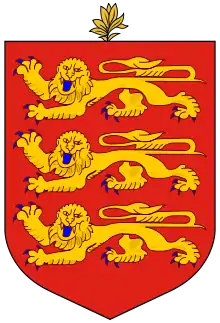Sarnia Cherie
"Sarnia Cherie" (English: Dear Guernsey) is used as the unofficial anthem of Guernsey, one of the Channel Islands. Sarnia is a traditional Latin name for the island.[1] George Deighton wrote "Sarnia Cherie" in 1911, with Domenico Santangelo composing the tune later the same year.
| English: Dear Guernsey | |
|---|---|
Regional anthem of the Bailiwick of Guernsey | |
| Lyrics | George Deighton, 1911 |
| Music | Domenico Santangelo, 1911 |
The anthem can be heard on a number of occasions each year, every 9 May Liberation Day,[1] at Island Games gold medal ceremonies,[1] the annual Viaër Marchi community festival in July, inter-island sporting events, etc.
History
The song was written in 1911 by George Deighton (1869–1935[1]), who had arrived on the island in 1908 to manage the St. Julian's Theatre. Having liked the island so much, he wrote a poem three years later, which he then asked Domenico Santangelo (1882–1970[1]) to write music for.[2] Santangelo composed a romantic waltz for the lyrics the same year.[2][3] It was first performed at St. Julian's Theatre (which later became Gaumont Cinema[2][4] and then an office complex[2]) at a benefit night in November 1911 by Wilfred Shirvell, a local hotelier and friend of Deighton.[2][3][4] Santiangelo then had the song published by a French music publisher of his acquaintance Fermo Dante Marchetti.[2]
During the Nazi occupation of the Channel Islands in World War II, the song gained even greater recognition as a local anthem,[2][5] and it was sung in the later years of the occupation and as British troops liberated the island on 9 May 1945,[6] including by groups of Guernsey evacuees all over the UK, as far as Glasgow.[2][4] The song remains heavily associated with the wartime experience in Guernsey.[1]
In 2005, the then Chief Minister of Guernsey, Laurie Morgan, called for an updated version of the song, which was abandoned after it met with near-universal opposition.
On 30 June 2009, a CD of 13 renditions of the song was released after an effort spearheaded by local campaigner Roy Sarre, who stated that "it wasn't easy getting copies of Sarnia Cherie".[4] The renditions included an 85-voice choir rendition by the Island Churches Guernsey Festival Chorus, a harmonica rendition by former tomato grower John Bourgaize[4] and a recording from 9 May 1945, when British troops landed in St. Peter Port to liberate the island after five years of German occupation during World War II. The sheet music was also rearranged by Ray Lowe of Sark, owner of the copyright of the music, which he released in September the same year.[4]
In 2012, a Guernésiais version of the song was written by Hazel Tomlinson, a member of the Guernésiais-speaking song and dance group La Guaine du Vouest (English: The Group from the West),[7] which was compiled into a CD of the same name of Guernésiais folk songs with English translations.[8]
Lyrics
| English version[1][3][6] | Guernésiais version[1] |
|---|---|
I |
I |
In popular culture
"Sarnia Cherie" was author G. B. Edwards's title for his novel The Book of Ebenezer Le Page on the original typescript he gave to his biographer and future publisher of the book Edward Chaney in 1974, but publishing house Hamish Hamilton decided to use his subtitle when they published it in 1981, choosing, however, to add Deighton's song as an epigraph instead.[9]
References
- Johnson, Henry (2021). "Performing Jurisdictional Politics in the Bailiwick of Guernsey: A Study of Anthems and Stamps" (PDF). Transformations (35): 8–11. ISSN 1444-3775. Retrieved 23 January 2022.
- "Local Anthem". Guernsey Scenes. Retrieved 23 January 2022.
- "Sarnia Cherie » History & Heritage". This Is Guernsey. Archived from the original on 24 October 2010. Retrieved 15 April 2011.
- BBC. "Sarnia Cherie on CD". www.bbc.co.uk. Retrieved 23 January 2022.
- Jones, Paul Anthony (7 November 2012). The British Isles: A Trivia Gazetteer. Summersdale Publishers Limited. p. 25. ISBN 978-0-85765-815-9.
- "Sarnia Cherie sing-along planned". Bailiwick Express. 9 May 2020. Retrieved 23 January 2022.
- "Sarnia Cherie | Guernsey". The Sarnian. 9 February 2016. Retrieved 23 January 2022.
- Johnson, Henry (December 2012). ""The Group from the West": Song, endangered language and sonic activism on Guernsey". Journal of Marine and Island Cultures. 1 (2): 99–112. doi:10.1016/j.imic.2012.11.006.
- The Book of Ebenezer Le Page
